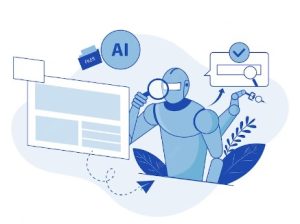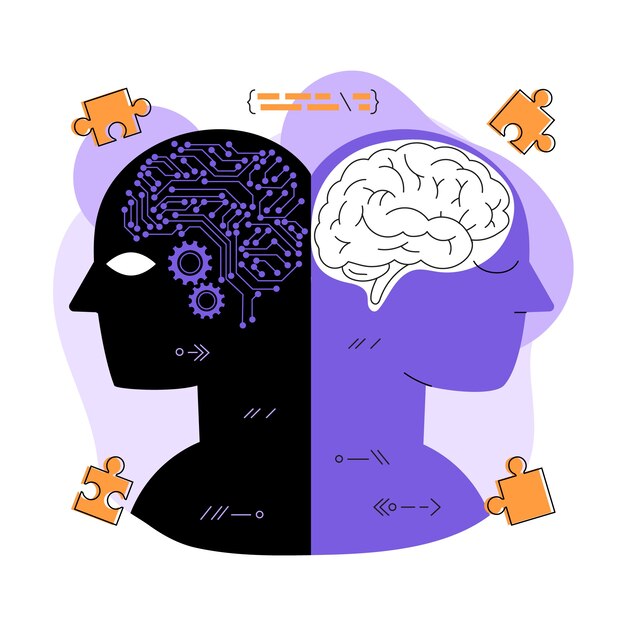AI-generated content, also referred to as AI-created content, is a revolutionary form of digital copy produced by advanced algorithms. These AI content generators can produce a range of materials, from detailed articles to social media posts, effectively mimicking human writing and thought processes. As the relevance of AI-generated content continues to grow, understanding how to leverage it for your content strategy is essential.
The Rise of AI in Content Creation
The buzz surrounding AI, particularly tools like ChatGPT, has sparked debates about its implications for the future of content creation. While some fear that AI might replace human writers, it’s crucial to recognize that these tools are designed to enhance, not replace, the creative process. AI can automate tedious tasks and streamline workflows, ultimately boosting the content creation process.
What Is AI-Generated Content?

AI-generated content encompasses various writing and design outputs created through machine learning, leveraging extensive datasets instead of traditional content creation methods. This technology enables the production of long-form articles, ad copy, and even images, allowing for diverse applications in digital marketing and communications.
How AI Content Generation Works
At its core, AI content generation relies on machine learning algorithms and natural language processing (NLP). These systems analyze vast datasets—comprising books, articles, and other texts—to understand the intricacies of language, including grammar and syntax. By doing so, AI tools like ChatGPT can predict and generate coherent text based on user prompts.
Why the Hype Surrounding AI-Generated Content?
The increasing discussions around AI and tools like ChatGPT can be attributed to their ability to simplify complex tasks. For instance, many users find that these AI generators can assist with brainstorming, content creation, and keyword research—tasks that typically consume significant time and resources.
The Impact on Content Creators
For content creators, the rise of AI content generators presents both challenges and opportunities. While the speed and efficiency of AI-generated content can be daunting, it’s essential to view these tools as valuable assets. Rather than replacing human creativity, AI enhances it by allowing writers to focus on strategic thinking and refining ideas.
Understanding AI-Generated Content in the SEO Landscape
Just as content creators can benefit from AI tools, SEO professionals also stand to gain. AI-generated content can automate repetitive tasks like keyword research, data organization, and meta description creation, enabling SEOs to focus on more strategic initiatives.
Benefits of AI-Generated Content
- Ease of Use: AI content tools are widely accessible and often free, allowing anyone to experiment and integrate them into their workflows.
- Quick Turnaround Time: These tools can produce content rapidly, making them ideal for time-sensitive projects.
- Source of Inspiration: AI-generated content can help brainstorm ideas, providing fresh perspectives and prompts for creators.
Limitations of AI-Generated Content
Despite their advantages, AI-generated content has limitations that users should be aware of:
- Lack of Human Touch: AI may struggle to capture the nuances and emotional depth inherent in human writing, which can impact audience engagement.
- Inaccuracies: AI tools can produce incorrect information, necessitating careful review by human editors.
- Built-in Biases: AI-generated content may reflect inherent biases from the training data, affecting tone and style.
- Awareness of Current Events: Many AI tools, including ChatGPT, are not updated with real-time information, which can hinder their relevance in fast-moving topics.
How Google Views AI-Generated Content

Google prioritizes content quality over production methods. According to their guidelines, the focus should be on delivering valuable, helpful content to users. This means that AI-generated content can rank well if it meets these criteria; however, poorly executed AI content risks penalties in search rankings.
Consumer Sentiment on AI-Generated Content
Recent surveys indicate that consumers desire transparency from brands regarding AI use. A significant majority believe brands should use AI responsibly and disclose when AI is employed in content creation. As a result, businesses must approach AI-generated content with care to maintain trust and credibility.
Best Practices for Incorporating AI-Generated Content into Your Strategy
1. Define Your Objectives
Before integrating AI into your content strategy, clarify your goals. Are you looking to streamline specific tasks or enhance your content quality? Identifying your objectives will help you leverage AI effectively.
2. Utilize AI as a Supplementary Tool
AI content generators should complement, not replace, human creativity. Use these tools for tasks like brainstorming, research, and drafting initial outlines, while reserving final edits and tone adjustments for human review.
3. Maintain Quality Control
Always review AI-generated content for accuracy, readability, and relevance. This step is crucial to ensure that the final output aligns with your brand’s voice and meets audience expectations.
4. Balance AI Use with Human Input
Establish a workflow that balances AI-generated content with human oversight. This approach will help you maintain a unique perspective and emotional depth in your content, preventing it from becoming generic.
Practical Use Cases for AI-Generated Content
SEO Applications
- Keyword Research: AI can enhance keyword research processes by identifying relevant terms and grouping them effectively.
- Content Brief Creation: Automating the content brief process can save significant time while ensuring thoroughness.
- Featured Snippets: AI tools can help craft optimized snippets to improve visibility in search results.
Content Creation Applications
- Generating New Copy: AI can create entire articles or social media posts, saving time for writers.
- Revising Existing Content: AI tools can assist in optimizing current content for better engagement and performance.
- Image Generation: AI-driven image generators can enhance visual content, streamlining design efforts.
Technical Applications
- Coding and Tag Generation: AI can simplify technical tasks, such as generating Schema markup or hreflang tags.
- Creating Regex Rules: AI can help formulate complex Regex rules to streamline data management tasks.
Conclusion:
AI-generated content is not just a passing trend; it’s a transformative tool that can enhance your content strategy. By understanding its benefits and limitations, and by implementing it thoughtfully, you can unlock new efficiencies in your content creation process. As you navigate this evolving landscape, remember that the ultimate goal is to provide high-quality content that resonates with your audience. Embrace AI as a supportive tool, and you’ll find ways to thrive in this new era of content creation.










